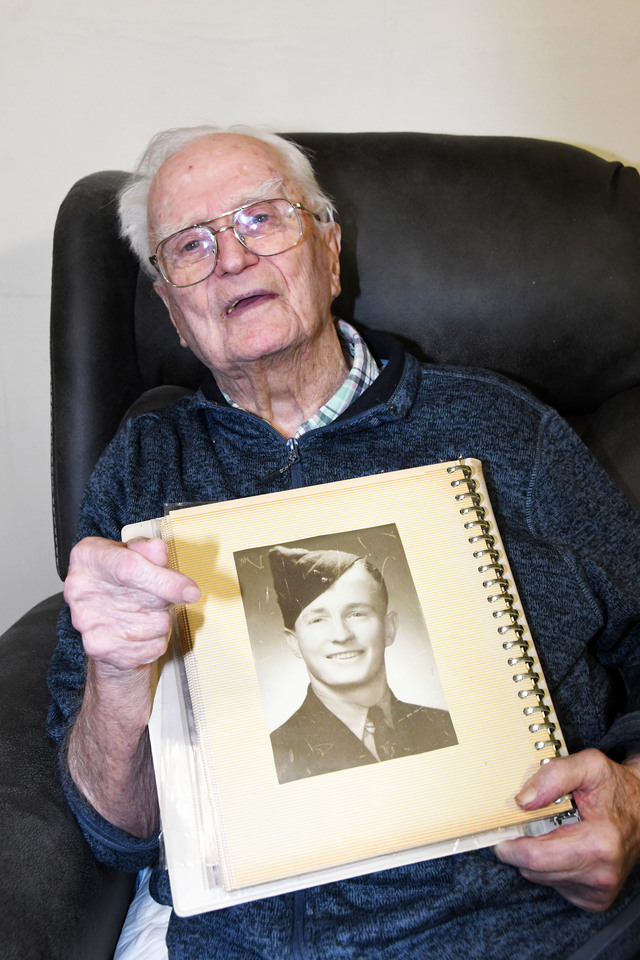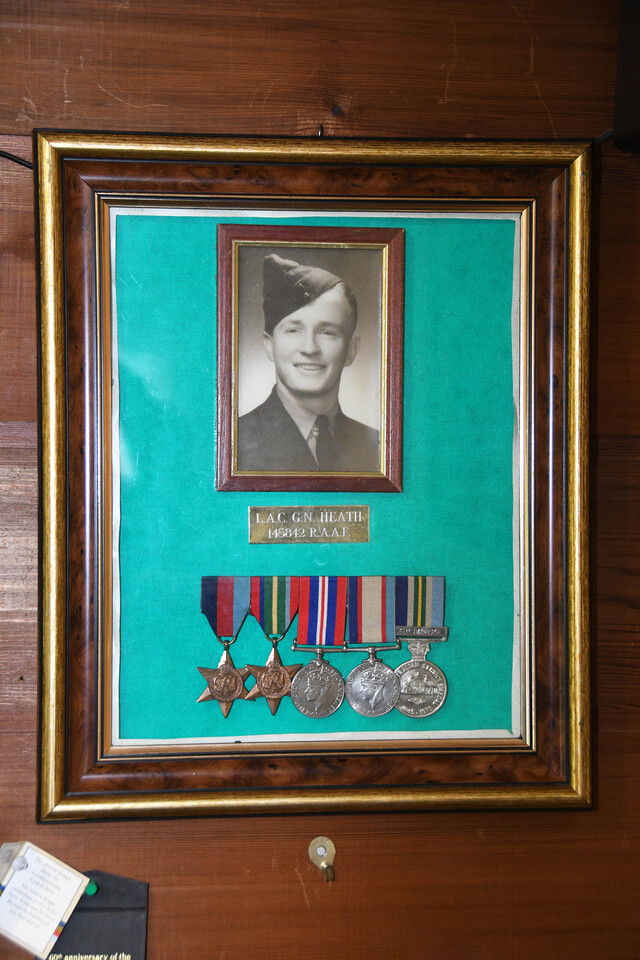
By Mikayla van Loon
From a young man growing up in the outer eastern suburbs of Melbourne to the Asian islands of Borneo and Morotai, World War II veteran Geoffrey Heath’s 100 years have been full of memories.
He celebrated his centenary on 6 June, with a gathering of family and friends, of which there are many, on 8 June at the Mount Evelyn RSL.
The former Royal Australian Air Force Leading Aircraftman was born in Camberwell as the second youngest of six, with one sister and four brothers.
He attended Camberwell South Primary School and then to the Melbourne Technical Junior High where he trained as a mechanic.
“It was the thing everyone wanted to be in those days,” Mr Heath said.
As someone who liked to work with hands, becoming a mechanic seemed like the best fit.
His first job, however, was at the age of 17 working at Snows Department Store selling menswear before he was hired by a garage where he developed his skills in car repairs.
Living life as a teenager, Mr Heath said he would frequent the cinema and dance school, the two activities that kept him entertained.
“It was ballroom dancing and normal dancing. We were taught a lot. He was a good teacher, him and his wife. I was quite happy there,” he said.
What made it even more special was meeting his wife of 55 years, Winifred, in one of the classes.
Mr Heath said at first, Winifred didn’t like him much but over time she came around and “we got together”.
After dating for a while, the pair soon became engaged.
By 1943, at 19 years of age, Mr Heath signed up to join the RAAF as an aircraft mechanic.
Sent to Shepparton, Mr Heath’s first experience as part of the RAAF was the medical, where he had 11 teeth pulled out and described getting poked by needles as feeling “like a porcupine”.
Joining the war effort without second thought, Mr Heath said “it was the thing you did in those times”.
“Training was very particular and we had to do what we were told. I learnt to keep my mouth shut.”
Conducting basic training and marching drills in Victoria, Mr Heath caught the train to Adelaide where he was taught to work on aircraft motors and how to repair them, something he said was entirely different from motor vehicles.
“Then I was posted to Mount Gambier for my first practical experience in the aircraft. Two of the aircraft I worked on crashed while I was there, not my fault, but because of pilot error,” he said.
Not just working on the ground, Mr Heath had his first flying experience in an Avro Anson aircraft, to which the pilot told him “grab a parachute, ‘you’re coming with me’”.
From Mount Gambier, Mr Heath was deployed to Townsville where he did jungle training to prepare for the terrain of the islands he was about to visit.
Boarding the American troop ship called the General McRae, it set sail for Morotai.
“And I went all over the world then.”
The journey was not without its challenges, with Mr Heath experiencing a terrible bout of seasickness, so bad he said he thinks it cured him for the rest of the trips he would take by ship.
In Morotai, Mr Heath was posted to the 22 RSU, the salvage and repair unit, where he first worked on Kitty Hawk fighter planes. They would later become his favourite form of aircraft.
With the war going on around him, Mr Heath however, was so exhausted from the journey across the seas, he slept through the night of his first bombing raid.
The bombing would only continue as Mr Heath island hopped to nearby Labuan, a smaller island off the west coast of Borneo, where he was tasked as part of a unit to clear the airstrip.
The best way Mr Heath could describe the islands was “rugged” and “hot and humid. I walked around in a pair of shorts and not much else at all.”
“We didn’t enjoy it there but it was just one of those things we had to do.”
During his time on the islands, Mr Heath said he could not go anywhere without his rifle, whether that be to sleep or the toilet.
Serving two years, the war was declared won in 1945 and Mr Heath was transferred to 13 Squadron.
It was here that he became a flight engineer of a Venturer Bomber and was tasked to the aircraft carrying Major General Colin Hall Simpson who organised the repatriation of prisoners of war.
Only afterwards did Mr Heath realise the job he undertook, saying “we didn’t think about it, we just did it”.
Seeing the condition of the POWs, Mr Heath said, wasn’t pleasant and was quite confronting.
Discharged, instead of sailing home, Mr Heath returned to Borneo, patched up a Venturer Bomber and flew to Adelaide.
The first thing he did was call Winifred to tell her he’d see her the next day.
Arriving at Laverton airport, Mr Heath jumped the fence and hitched a ride to Melbourne and caught a tram home.
Nine weeks later, he and Winifred married.
They honeymooned in Marysville, to which Mr Heath said was “a real bush town”.
Moving from an apartment in Hawthorn to their first home in Blackburn South, Mr Heath has always lived in the east, now residing in Mount Evelyn with his daughter Jeanette, because “it’s a good place to be”.
Working full time, first for Camberwell Council as a mechanic and then for Ringwood Council as a cost clerk, Mr Heath worked part time jobs as well as a theatre usher, as a football umpire, a petrol station assistant and at the Ringwood bowling alley teaching people how to bowl.
“He was a man of many talents,” Jeanette said.
“He was always busy. I never knew him to be able to sit still.”
Mr and Mrs Heath had five beautiful children, Colin, Don, Brian, Bev and Jeanette, and have extended the family to 14 grandchildren, 27 great grandchildren and two great great grandchildren.
Sadly, Winifred died in 2001 after being ill but the couple were able to share many happy years together, especially travelling around Australia in their caravan.
“I’ve had a great life, with good people to look after me and I’ve been able to look after them.”







